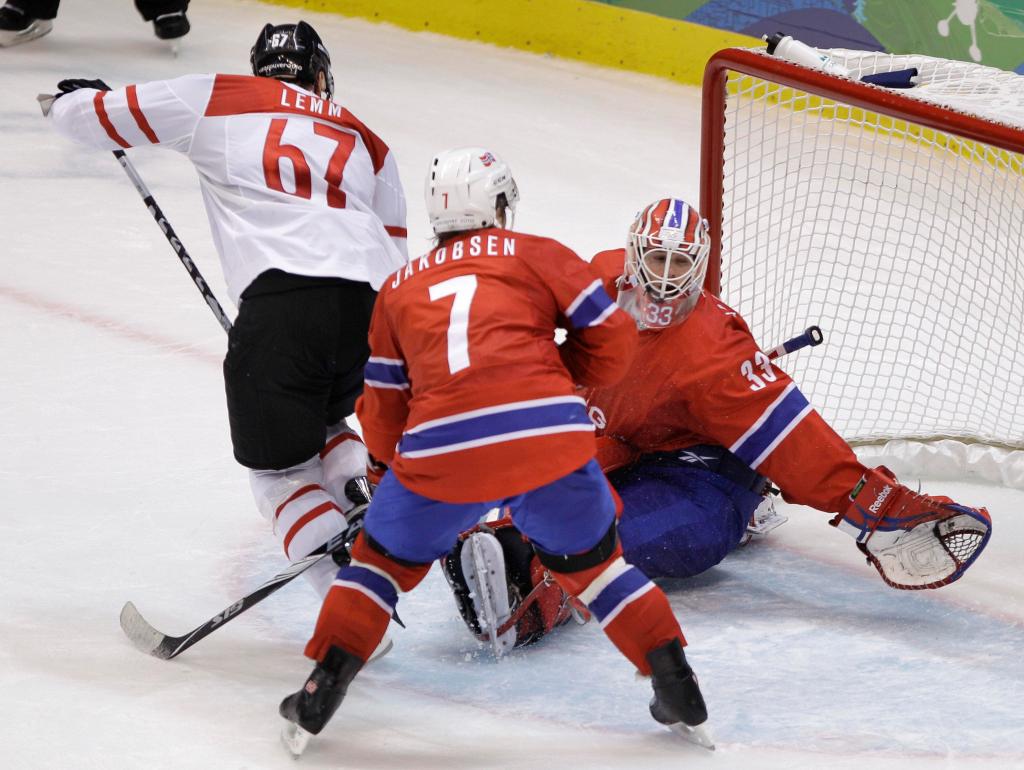VANCOUVER, British Columbia – Sometimes a hockey game is about more than a final score, a place in the standings, a line in a record book. Sometimes it’s personal.
For Jaromir Jagr, it’s all about his No. 68. For Marek Zidlicky, it’s being taught a language he didn’t want to learn.
For Teemu Selanne, it’s alternately loving and hating the team he’s about to play. For Sidney Crosby, it’s getting an upper hand on an opponent he’s likely to encounter often in a career that is only starting.
Get ready for hockey’s version of Super Sunday, a day when the field is sorted out for what should be a dramatic final week of the Olympic tournament. Six teams with long and sometimes antagonistic relationships go head-to-head in rematches of each of the last three Olympic finals.
Best friends playing best friends: Canada meets the United States, a replay of 2002.
Bad feelings renewed: Russia plays the Czech Republic, a rematch from 1998.
Bordering countries who are the biggest of rivals: Sweden faces Finland, as in the 2006 gold-medal game.
”Anybody who’s a hockey fan is going to be watching,” U.S. Coach Ron Wilson said. ”To steal a line from Badger Bob (Johnson, the late coach), it’s a great day for hockey.”
And which game is the biggest depends strictly on one’s citizenship papers.
For Canada, the widely perceived gold-medal favorite, it’s a game that could signal whether a lineup dramatically altered from the one that finished seventh in 2006 is a team of substance or one of self-promoted hype.
The Canadians struggled to beat Switzerland 3-2 in a shootout on Thursday; and the United States, winner of its first two games, is much faster and more skilled and should offer a much tougher test than the Swiss.
”The gold-medal game isn’t (today), and that’s probably the good news,” said Crosby, who possibly saved Canada from a humiliating loss by scoring in the shootout to beat the Swiss.
Crosby knows a Canadian team thrown together with one day’s practice needs more time and work to start meshing, and the Americans will offer a significant test.
U.S. forward David Backes talks respectfully of ”who knows how many Hall of Famers” the Americans will be playing, yet he understands this is a chance for a possibly overlooked team to move itself to the front of the medal chase by beating the big favorites on their home ice.
”A goalie like (Ryan Miller) can steal games for us, especially against Canada, and hopefully he does that,” said forward Bobby Ryan, a former Portland Pirate. ”He makes guys calm, he has a great presence in net, and we’re confident in him.”
This will be only the third major showdown between the North American neighbors since 1996, when the United States upset Canada in the World Cup. The other came in Salt Lake City in 2002, when Canada won 5-2 for its first gold medal in its homegrown sport in 50 years.
”We’ve got a lot of young guys who haven’t really played in huge games like Stanley Cup finals, and this is going to be huge,” Wilson said.
Today’s crowd? Somewhat bigger than the estimated 700 who turned out for Canada’s 2-0 victory over the United States in Antwerp in 1920. On eBay, two seats were selling Saturday for $1,500 to $2,000 apiece, depending on their location in Canada Hockey Place. And the medal round has yet to begin.
”We’re as ready as I guess we’re going to be, right?” forward Ryan Malone said.
The Czech Republic is always ready to play the Russians, as evidenced by two of the last three Olympics. Each time the Czechs won a medal – the gold in 1998, the bronze in 2006 – by beating Russia. Each time, the victory was cheered by millions back home, and for reasons that extend far beyond a sheet of ice.
The Soviet Union invaded the former Czechoslovakia in 1968 following the Prague Spring, a period of political liberalization, and four decades of communist rule didn’t end until 1989. Jagr’s grandfather died in prison in 1968, and Jagr wears No. 68 in his honor, even in Russia, where he now plays in the Kontinental Hockey League.
Zidlicky, who is 33, recalls being forced to learn Russian during his early years of schooling.
”We play for everything against them,” Zidlicky said.
Sweden and Finland each won their first two games of round-robin play in regulation, so the winner is guaranteed of advancing to the quarterfinals. Sweden beat Finland 3-2 for the gold medal in an all-Nordic finals in Turin, but today’s loser may have a much more difficult route to the finals.
Send questions/comments to the editors.



Success. Please wait for the page to reload. If the page does not reload within 5 seconds, please refresh the page.
Enter your email and password to access comments.
Hi, to comment on stories you must . This profile is in addition to your subscription and website login.
Already have a commenting profile? .
Invalid username/password.
Please check your email to confirm and complete your registration.
Only subscribers are eligible to post comments. Please subscribe or login first for digital access. Here’s why.
Use the form below to reset your password. When you've submitted your account email, we will send an email with a reset code.